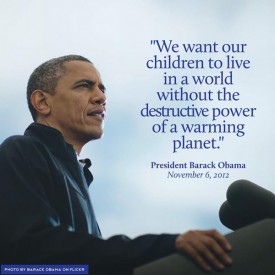"Agenda 21 Hell" -Obama Executive Order to Prepare the Nation for Climate Change
Susanne Posel wrote today on Facebook, concerning her latest article below:
OccupyCorporatism
President Obama issued an executive order (EO) entitled
“Preparing the United States for the Impacts of Climate Change” this week to
once again circumvent Congress.
Obama threatened back in February that he would issue an EO
on climate change for the sake of future American generations if Congress will
not act.
The EO addresses the US government’s response to preparing
“the Nation for the impacts of climate change.”
This includes prolonged periods of:
- Excessively high temperatures
- Heavy downpours
- Increased wildfires
- Severe drought
- Permafrost thawing
- Ocean acidification
- Sea-level rise
During such times, the government will collaborate with
“affected communities, natural resources, ecosystems, economies, and public
health across the Nation.”
Pressures of climate change are being felt by “species and
habitats” that are in need of being protected.
Obama asserts that “managing these risks requires deliberate
preparation, close cooperation, and coordinated planning by the Federal
Government, as well as by stakeholders, to facilitate Federal, State, local,
tribal, private-sector, and nonprofit-sector efforts to improve climate
preparedness and resilience; help safeguard our economy, infrastructure,
environment, and natural resources; and provide for the continuity of executive
department and agency (agency) operations, services, and programs.”
Using executive order 13514 as the foundation, Obama is
defining an action plan of “preparedness” to empower federal agencies to:
- Engaged and strong partnerships and information sharing at all levels of government
- Risk-informed decision-making and the tools to facilitate it
- Adaptive learning, in which experiences serve as opportunities to inform and adjust future actions
- Preparedness planning
Obama’s EO establishes a Task Force on Climate Preparedness
and Resilience (TFCPR) to find federal funding to be spent on interior US
infrastructure with regard to combating climate change.
Communities living in areas deemed at risk for disastrous
effects of climate change. Those involved with the panel include:
- Mayor of Los Angeles Eric Garcetti
- Mayor of Philadelphia Michael Nutter
- Mayor of Huston Annise Parker
Included in the EO are pathways to boost “renewable energy
production on federal lands, increase efficiency standards and prepare
communities to deal with higher temperatures.”
According to the Fact Sheet on the EO on climate change
“preparedness” the TFCPR will advise the Obama administration on how to deal
with changes to our environment.
The TFCPR is expected to collaborate with “state, local and
tribal leaders from across the country who will use their first-hand experiences
in building climate preparedness and resilience in their communities to inform
their recommendations to the Administration.”
Governors in states such as California, Illinois, Washington
State, Florida, Texas, Colorado and New Jersey will compromise the TFCPR to
ensure infrastructure is protected; and “modernizing Federal grant and loan
programs to better support local efforts, and developing the information and
tools they need to prepare.”
To protect “America’s communities and economy . . . more than
30 Federal agencies developed their first-ever Climate Change Adaptation Plans,
outlining strategies to protect their operations, programs, and investments to
better serve communities and safeguard our public resources in the face of
climate change.”
One major concerns of the Obama administration is sea level
rise and one purpose of the EO is to “communities to provide funding and
technical assistance to address local climate impacts such as sea level rise,
flooding, and water scarcity.”
- Find ways to make it easier for cities and towns to build smarter and stronger
- Identify and remove any barriers to resilience-focused actions and investments– for example, policies that encourage communities to rebuild to past standards after disasters instead of to stronger standards – including through agency grants, technical assistance, and other programs in sectors from transportation and water management to conservation and disaster relief
- Directs agencies to identify changes that must be made to land- and water-related policies, programs, and regulations to strengthen the climate resilience of our watersheds, natural resources, and ecosystems, and the communities and economies that depend on them
- Evaluate how to better promote natural storm barriers such as dunes and wetlands, as well as how to protect the carbon sequestration benefits of forests and lands to help reduce the carbon pollution that causes climate change
- Instruct Federal agencies to work together and with information users to develop new climate preparedness tools and information that state, local, and private-sector leaders need to make smart decisions
- Make extensive Federal climate data accessible to the public through an easy-to-use online portal
- Builds on the first-ever set of Federal agency adaptation plans released earlier this year and directs Federal agencies to develop and implement strategies to evaluate and address their most significant climate change related risks

